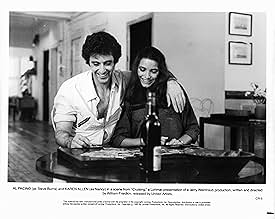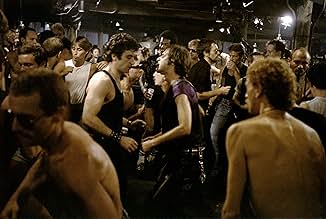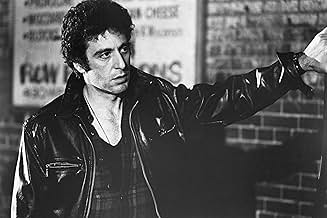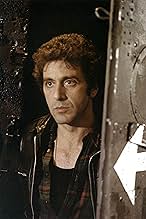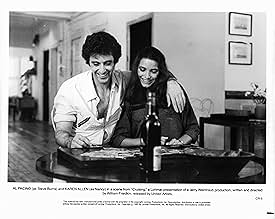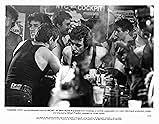न्यूयॉर्क शहर के भूमिगत एस एंड एम समलैंगिक उपसंस्कृति में एक पुलिस जासूस अंडरकवर हो जाता है, ताकि वह समलैंगिक पुरुषों का शिकार करने वाले सीरियल किलर को पकड़ सके।न्यूयॉर्क शहर के भूमिगत एस एंड एम समलैंगिक उपसंस्कृति में एक पुलिस जासूस अंडरकवर हो जाता है, ताकि वह समलैंगिक पुरुषों का शिकार करने वाले सीरियल किलर को पकड़ सके।न्यूयॉर्क शहर के भूमिगत एस एंड एम समलैंगिक उपसंस्कृति में एक पुलिस जासूस अंडरकवर हो जाता है, ताकि वह समलैंगिक पुरुषों का शिकार करने वाले सीरियल किलर को पकड़ सके।
- पुरस्कार
- 5 कुल नामांकन
Ed O'Neill
- Det. Schreiber
- (as Edward O'Neil)
फ़ीचर्ड समीक्षाएं
In New York, the ambitious police officer Steve Burns (Al Pacino) is assigned by his Captain Edelson (Paul Sorvino) to work uncover in the gay S&M underworld to seek out the serial-killer that is killing and severing the members of gays since he has the same appearance of the victims. Steve has the objective to be promoted to detective and get his golden shield and Capt. Edelson is the only one in the department who knows Steve's assignment.
Steve does not tell to his girlfriend Nancy (Karen Allen) his mission and he needs to learn the behavior of this community. During the investigation, Steve is affected by the discoveries in this new world, but Captain Edelson does not want him to quit his assignment.
In the 70's and 80's, Al Pacino was among my favorite American actors with his magnificent performances. "Cruising" is an original movie that discloses part of the society unknown to straight persons like me: the gay S&M world of New York in the late 70's.
I have seen this film at least four time and today for the first time on DVD, and my greatest question is how far a person would go to be promoted. Steve Burns dreams on having a golden shield and when he has his chance, he accepts a dangerous psychological mission to find the serial-killer that is killing gays and affects his personal life and his relationship with his girlfriend. The conclusion is one of the most ambiguous that I have ever seen in an American movie, when Steve looks at his image on the mirror. My vote is eight.
Title (Brazil): "Parceiros da Noite" ("Night Partners")
Steve does not tell to his girlfriend Nancy (Karen Allen) his mission and he needs to learn the behavior of this community. During the investigation, Steve is affected by the discoveries in this new world, but Captain Edelson does not want him to quit his assignment.
In the 70's and 80's, Al Pacino was among my favorite American actors with his magnificent performances. "Cruising" is an original movie that discloses part of the society unknown to straight persons like me: the gay S&M world of New York in the late 70's.
I have seen this film at least four time and today for the first time on DVD, and my greatest question is how far a person would go to be promoted. Steve Burns dreams on having a golden shield and when he has his chance, he accepts a dangerous psychological mission to find the serial-killer that is killing gays and affects his personal life and his relationship with his girlfriend. The conclusion is one of the most ambiguous that I have ever seen in an American movie, when Steve looks at his image on the mirror. My vote is eight.
Title (Brazil): "Parceiros da Noite" ("Night Partners")
Viewed today, "Cruising" still elicits intense responses from both Gay and straight viewers alike. Mainstream Gays lament, as many protestors of the film at the time of its release, that it shows a homophobic image of Gay life, depecting them as sex-obsessed. Straights are put off by the frank look at the Gay sex "cruising" culture.
Interesting, however, some of the people involved in the Leather/SM subculture at the time this film was made have praised it for its accuracy of this particular lifestyle -- a pre-AIDS lifestyle concentrated on quick sex that was (and still is) pursued by a segment of the Gay community.
The film does not pretend to depict Gays as a whole. It is just a drama about a police investigation that uses the scene as a background and catalyst for an exploration into how one cop is affected by his work.
Not the greatest film ever made, but certainly a good springboard for discussion about the Gay community's politics, when one fully examines the controversy surrounding the film and the continued debate over public sex and body image in the community.
The strengths of "Cruising" are its use of locales and documentary-style cinematography, as well as the interesting performance from Paccino. In the end, it is hampered as a drama by problems with the narrative structure of the piece that seems to fizzle out in the last act, leading to an intriguing, but inconclusive, finish.
Interesting, however, some of the people involved in the Leather/SM subculture at the time this film was made have praised it for its accuracy of this particular lifestyle -- a pre-AIDS lifestyle concentrated on quick sex that was (and still is) pursued by a segment of the Gay community.
The film does not pretend to depict Gays as a whole. It is just a drama about a police investigation that uses the scene as a background and catalyst for an exploration into how one cop is affected by his work.
Not the greatest film ever made, but certainly a good springboard for discussion about the Gay community's politics, when one fully examines the controversy surrounding the film and the continued debate over public sex and body image in the community.
The strengths of "Cruising" are its use of locales and documentary-style cinematography, as well as the interesting performance from Paccino. In the end, it is hampered as a drama by problems with the narrative structure of the piece that seems to fizzle out in the last act, leading to an intriguing, but inconclusive, finish.
Crusing is a very dark psychological thriller from acclaimed director William Friedkin and leading man Al Pacino. Based on true events where a serial killer preyed on gay men part of the S+M gay leather scene in NYC, pre AIDS, where casual sex or cruising was a big thing in that scene. Al Pacino goes deep undercover to attempt to bring down the killer. This film only shows one side of the gay community, which was controversial and brought a polarizing reaction in the gay community in that time. The gay S+M clubs, parks and other areas of NY are the backdrop to this sleazy, violent and downbeat thriller. Al Pacino is excellent, as is the support cast of Paul Sorvino, Joe Spinell and Karen Allen as Pacino's girlfriend. The film is similar in a lot of ways to the Italian giallo films and it seemed to borrow some of its ambiance and style. While most of what happens in the film is pretty ambigious, it seems that as the film progresses Al Pacino seems to identify more with the gay community. This film is very well done and very much in the 70's style, gritty, suspenseful and uncompromising in its presentation. Crusing certainly will not appeal to everyone, but for those that like this kind of film, it is very well done.
What strikes me while watching the film, is that truth to reality is really refreshing. No editing in the world can make up to a camera catching a dark, rainy street as they could back in those days when equipment was not developed. Aristoleles claimed that cruelty should be committed outside the scene, that is, in the background. The imagination of the spectator is far more imaginative than a view of the actual event. Therefore, leaving out is stronger in terms of storytelling than showing. Quite the contrary to contemporary movies, I'd say. The advantage of this story is thus the suspense built up on lack of knowledge. There is no flirting with the audience; you do not know in advance who dunnit. There is no flirting with the audience on the task of staging one of the protagonists as a gay either. This is not the greatest movie, but really worth seeing.
Knowing that this was inspired by true events and what really happened, I understand why the film may seem as one giant plot hole to some viewers. I know most people want a definitive answer and this movie doesn't exactly make it clear for the viewer. Done intentionally by Friedkin to reflect the true story's mystery, which I think is brilliant. That said, I wish the cast was hotter and I still can't believe Al Pacino did this film. I love it. It's such an amazing documented piece of Homosexual life before AIDS hit. Something we will never see or experience ever again.
क्या आपको पता है
- ट्रिवियाTwo of the notorious gay bars featured in the film - Mine Shaft and Eagle's Nest - eventually barred William Friedkin.
- गूफ़When the first victim gets stabbed blood is shown running off his shoulder but the knife is spotless.
- भाव
Steve Burns: Hips or lips?
- क्रेज़ी क्रेडिटThe film only opens with the title in large letters, across the screen. It is only at the end where the filmmakers are credited.
- इसके अलावा अन्य वर्जनUK cinema and 1987 video versions were cut by 54 secs by the BBFC. The 1997 Maverick Directors video release was cut by 39 seconds to remove subliminal shots of anal sex during the murder scenes (one of which appears in the film though heavily darkened) and to edit a pan shot of a gay bar interior and shots of a knife being traced over a bound victims body. Although the uncut version was shown by Sky TV the film was resubmitted to the BBFC in 2003 for a FilmFour showing and many cuts were restored apart from a 1 sec edit to remove the subliminal shots. For the initial release on UK DVD in 2008 all the cuts were waived.
- साउंडट्रैकThree-Day Moon
Performed by Barre Phillips
टॉप पसंद
रेटिंग देने के लिए साइन-इन करें और वैयक्तिकृत सुझावों के लिए वॉचलिस्ट करें
- How long is Cruising?Alexa द्वारा संचालित
विवरण
- रिलीज़ की तारीख़
- कंट्री ऑफ़ ओरिजिन
- भाषा
- इस रूप में भी जाना जाता है
- Encrucijadas
- फ़िल्माने की जगहें
- उत्पादन कंपनियां
- IMDbPro पर और कंपनी क्रेडिट देखें
बॉक्स ऑफ़िस
- बजट
- $1,10,00,000(अनुमानित)
- US और कनाडा में सकल
- $1,97,98,718
- दुनिया भर में सकल
- $1,98,15,555
इस पेज में योगदान दें
किसी बदलाव का सुझाव दें या अनुपलब्ध कॉन्टेंट जोड़ें



